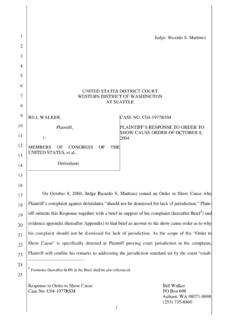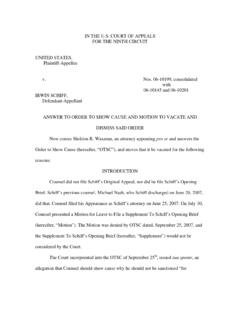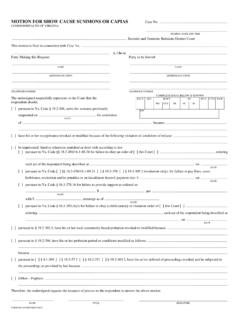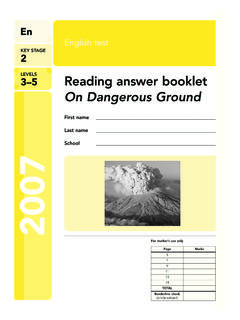Transcription of The best way to answer these questions is to provide a ...
1 The best way to answer these questions is to provide a truthful and factual answer to the query. This answer normally depends on whether or not you have faced any experiences that have been challenging in your previous job. Your answer should begin with the following phrases: A past challenging experience I dealt with was [..]. This was a challenge because [..]. To resolve the issue, I [..] Then, divide the answer into 5 parts: The following are examples of questions Tell me about a difficult decision that you have made. Tell me about an unpopular decision you have made. In order to answer these questions effectively, make sure you understand what competency the interviewer is addressing and what component skills and behaviours make up that competency. For example, solving a problem may be very simple but if you look back to competencies 6 and 7 you can see that you re going to need to fit in a fair bit of info to satisfy this question as it involves: detailing the problem explaining how you approached/ analysed it and broke it down what resources did you use to help formulate effective solutions how did you select the most appropriate solution how did you implement it what were the results A good interviewer will structure this conversationally, so you can break your answer up and be receptive to probing questions .
2 A bad/ less competent interviewer will need you to do most of the structuring. Therefore, you have to be concise yet forthcoming with the info to make sure to give your best. Apply this technique of breaking down competencies into their components in order to select the strongest examples from your experience to fit the questions . This will help when structuring as well. When the interviewer asks the question about your most challenging experience and the actions you took to solve the problem (or the case), remember that the interviewer is trying to get a brief idea of several aspects related to your personality: Your problem solving and analytic thinking skills. Your ability to work in a stressful environment. How do you handle stress and pressure? How do you cope with complex situations? Read Problem Solving Interview questions Problem Solving Job Interview questions can be asked in different ways and as follow up questions , for example: How did you handle your most challenging experience in your previous job?
3 Describe the problem and the way you collect info and establish a problem solving model. How do you build a troubleshooting process? What are the steps you take for a project that requires collection of systematic data and risk management for conducting a performance analysis What are the steps you take to anticipate risks and resolve issues? Give an example of an effective/innovative solution you created to solve a problem. Problem Solving Interview answers The best way to answer these questions is to provide a truthful and factual answer to the query. This answer normally depends on whether or not you have faced any experiences that have been challenging in your previous job. Your answer should begin with the following phrases: A past challenging experience I dealt with was [..]. This was a challenge because [..]. To resolve the issue, I [..] Then, divide the answer into 5 parts: 1.
4 Define the Problem Describe the problem in the workplace. What makes it a problem? What does this problem involve? 2. Analyze the Problem Tell about how you collected information for data analysis: the process you utilized for extracting maximum information from the facts. 3. Generating Possible Solutions Explain the factors taken into consideration when making a decision: how did you get to the root cause of the problem? How did you identify the likely causes of the problem? How did you generate a number of possible solutions? 4. Selecting the Best Solution(s) and courses of action Describe the actions you took: why did you choose these actions? What results did you expect to achieve? Describe how you organized ideas into process flow and common themes and the way you monitored results. Don t forget the risk management factors. 5. Lesson learned What did you achieve? What was going right?
5 What did you learn from that experience? You may find useful information reading the articles questions about decision-making and judgment skills are asked in many job interviews, however most likely to be asked in interviews for executives positions and positions that require making quality decisions, such as: project managers, customer service, medical, finance positions and many more. We all make decisions every day People follow basic logical process for making decisions. We all view issues in (each on his own) unique angle, though there are some who have exceptional natural When asking questions about your decision making skills, the interviewer is looking for the method/s you use to reach a decision. Are you a good decision maker? You have to realize that in reality different forms of decisions are ok for different cases. In an interview, it is your time to demonstrate that you have a balanced thinking process and, if required, you are able to make quality decisions assertively but never too impulsively.
6 Here are some questions that can be asked: Can you tell about any past critical situation in which you had to make an immediate decision? Give an example of a situation in which you had to make a decision when you didn t have all facts available. What process do you follow for making decisions for these different circumstances and were you satisfied with the results? The examples that you give should show how resourcefulness and initiative you are. Many a times, we make decisions based on instinct having incomplete data. However, though the word is not ideal, an individual who possesses good logical and analytical skills will make high-quality decision when he takes the following procedure: 1. Using available info Based his process on the information to hand. 2. Analyzing Knows how to break complex issues into components. 3. Critical Thinking Considers the outcomes of varying course of actions.
7 4. Investigating Can take conclusions from different sources of data. 5. Acting Can make decisions without complete info. Doesn t hesitate to act and able to make sound decision patiently, but in a timely manner. 6. Responsibility Does not put off making a decision to avoid conflict, getting it wrong . Not afraid to take risks to come to a solution. Doesn t delay actions because of outcomes or reactions. 7. Studding Demonstrate a lesson learned ability in order to progress. At the end of your answer , it is a good time to tell that you are not always perfect. Admit your fallibility: There were times when some decisions had turned out to be wrong, however I am sure, that these wrong decisions have made a mark on me so that I learn from it to avoid the same mistakes again. Do you always take the process on your own? On what occasions do you recognize that you need other s help?
8 Do you always use established procedures to ensure that the correct action is taken? It is ok to tell that you to ask for advice and information when you are unable to get it by yourself as you are always looking for the best decision. You also have to talk about your ability to take hard decisions (sometimes initiatives or creative ones) independently if required. You seek for being practical when assessing multiple, complex or contradictory data in order to reach the right decision. Show that you understand Cause and Effect and during the decision-making process you are able to evaluate the relationship between short-term consequences and long-term gains. Critical Thinking Interview questions Critical thinking is known as the high level of decision making process. The interviewer may ask you to define the meaning of critical thinking and to assess the importance of it to the decision making process.
9 He may also present an issue and will want you to identify point of views, classify approaches or analyze a theory within this issue. He will want to observe your knowledge of using thought processes taking an issue and structure your analysis in a balanced way. How to answer these questions : First let s define the term Critical thinking allows us to take control of our thinking rather than letting it become hijacked by mindset, assumptions and bias thus to understand the pathway and inputs that the thinking employs. It is the best way to approach problem solving with a level of detachment that permits a thorough and balanced analysis. Critical thinkers take the time necessary to make excellent decisions rather than choosing to make fast, good-enough decisions. They seek first to understand and to find out what they do not know before reaching conclusions (or judgment) so as to make more effective decisions as a result.
10 Critical thinking is questioning. It requires practicing. Therefore, Show that you are questioning the process s elements you are using. You can talk about instances from your past when you had to base your actions and judgments on the competent assessment of relevant reasons/evidence and how you ve monitored each route way of thinking. Way of thinking (or reasoning) is always based on the information gathered. Critical thinker must ask himself upon which information am I basing my reasoning? Have I checked facts and refreshed my data? he never takes things for granted and that is what you have to demonstrate during the interview. Solving a Problem Interview questions Problem solving job interview questions can be formed in any work related case that the interviewer will present to you asking you to analyze it and suggest resolutions. Further reading: Case Study Interview questions Similar to the decision making questions , the interviewer may also want you to tell about any real challenging problem that you had experienced in your previous job trying to assess your performance.






